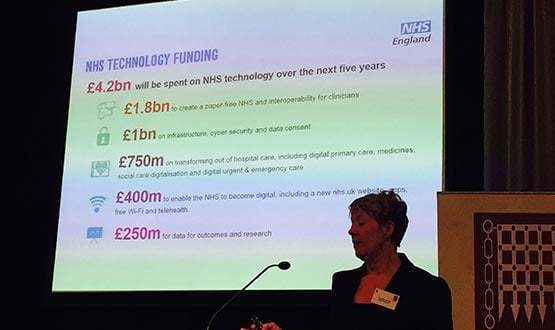Details of £1.8b tech funding revealed
- 9 February 2016

NHS organisations will have access to £1 billion in capital funding and £400 million in revenue to help them become paperless over the next five years.
The figures were presented by NHS England’s director of digital technology Beverley Bryant at a Westminster Health Forum on ‘Electronic patient records and IT in the NHS’ today.
They follow health secretary Jeremy Hunt’s announcement over the weekend that the government will be investing £4.2 billion in NHS technology over the next five years, including £1.8 billion for achieving a paperless NHS by 2020.
Bryant confirmed that of the £1.8 billion, £900 million will be capital funding made available to the "frontline NHS".
Another £400 million is revenue funding to support the running costs of the capital investment and is coming from the Sustainability and Transformation Fund established as part of NHS England planning guidance released last month.
She said there is some capital funding available for the coming financial year, but much of the revenue funding will be allocated towards the end of the five year period.
However, she confirmed there is both capital and revenue funding available for every year of the programme.
Bryant told the audience that in her experience, organisations think they can spend money faster than they can and so ensuring money is allocated for the right years is very important.
Further details around funding allocations will be made public in April.
While these details are yet to be finalised, the way in which organisations will get access to the funding has been agreed.
As previewed in Digital Health News, allocation of money will be done differently from in the past, when organisations would apply to a dedicated technology fund for specific projects such as e-prescribing.
The plan now is for NHS England to look at an organisation’s Sustainability and Transformation Plan and the Local Digital Roadmap they are covered by; along with where they sit on the digital maturity curve; and decide how much funding the organisation will get for technology.
The newly announced Sustainability and Transformation Plans are due to be submitted to NHS England in June and the deadline for the submission of Local Digital Roadmaps – which should outline how an area plans to become paperfree by 2020 – has been pushed back from April to June to align with this.
Digital maturity assessments had to be filled out by trusts and were due in last month.
"This time around the dishing out of the cash will be embedded in the way Sustainability and Transformation Plans are being funded,” Bryant told Digital Health News.
"We'll take those plans and will also look at the digital maturity of the organisation and use these two things to form the basis of the decision about money that we then give to them."
Bryant expects that with this approach, all organisations will receive some funding.
She also said NHS England completely backs the recent report produced by Lord Carter, which recommends that a “meaningful use” clause should be put into provider contracts to encourage uptake of digital technologies.
"Meaningful use is still really central to our thinking,” Bryant said.
“We constructed the digital maturity assessments framework to measure use by clinicians of the technology, rather than software bought.
“The intention of Carter is that we hold providers to account for delivering digitally usable systems for their clinicians and staff and the way in which that would be enforced will be through measurement through the digital maturity assessments.”




